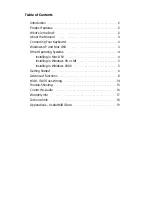
3
About the Manual
This instruction manual covers the operation of the Keystation 49e USB
keyboard. Though we do not provide detailed explanation about how to set up
your keyboard for use with third party music software, the majority of these
software applications will work seamlessly with the Keystation 49e keyboard.
Connecting Your Keyboard
Before You Connect...
You can power the keyboard either via USB or an optional external power
supply. However, the Keystation 49e is a very low power device and an
external power supply should not be necessary. It is recommended that you
connect the Keystation 49e to an onboard USB port or to a powered USB hub.
Power & Connection Via USB
1. Check that the on/off button on the back of the unit is set to “OFF.”
2. Plug the USB cable provided with the Keystation 49e keyboard to a free
USB port on your computer.
3. Plug the other end of the USB cable to the USB input on the Keystation 49e.
The single USB cable not only powers the keyboard but also sends MIDI data
to and from your computer system.
Using An External Power Supply
You can also use a power adapter (not included) with the following
specification: 9V DC output, 250- 300mA, center positive.
Make sure you are not already powering the Keystation 49e keyboard via USB—
if you are receiving power from the USB hub, no External supply is needed. If
not, then simply plug the power supply in to the “DC 9V” input and switch the
power on.
Note:
Do not leave the adapter plugged in for long periods of time if the unit is not in use.
Windows XP and Mac OSX
If you are using Windows XP or Mac OSX, you can now simply switch the
keyboard’s power switch to the “ON” position. Because the Keystation 49e
keyboard is class compliant, it will work without any further installation.




































